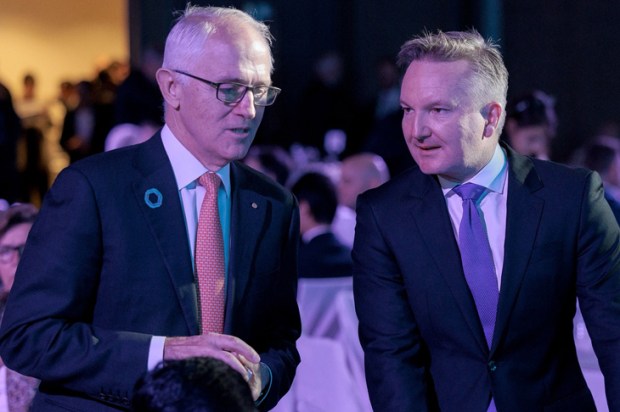I had almost got sick of my in-house competition of the most incompetent Labor ministers. Climate Change Minister Chris Bowen, B1, was leading by several laps, so what was the chance of any other Labor minister catching up? The disastrous energy transition, the blowout of Snowy 2.0, the gathering revolt against new renewable energy projects and transmission lines, rising electricity prices – has anything gone right for our intrepid climate warrior?
But just when I thought I might give up, Employment and Workplace Relations Minister, Tony Burke, B2, begins to gather pace with the release of a new 284-page piece of legislation with over 500 pages of accompanying explanatory memorandum that don’t actually explain anything. Suddenly it looks as though it could be a tight contest after all.
B2 scores a lot of points on the incompetence/shifty scale for the title of the new Bill – Closing Loopholes. It does no such thing; indeed, B2 concocts problems in the labour market in order to address them through punitive but highly union-favourable provisions. The fact that the massive Bill will impose substantial economic costs is neither here nor there to B2: if the union bruvvers want these changes, he will deliver.
It’s worth going through the legislation in some detail to establish just how bad it is. But the foundational premise on which it is based is that the only legitimate form of employment is permanent employee, preferably full-time, with a host firm. Everything else – casual, independent contractor, gig worker, labour hire worker – is illegitimate and should be either prohibited or purposefully discouraged.
Of course, one reason for this presumption is that it is only permanent employees who show any inclination to join unions and, even then, not in very high proportions. Take the comparison between permanent employees and casual workers: around 20 per cent of permanent employees are union members (and bear in mind many of them work in the public sector) while only 6 per cent of casuals join up.
From the unions’ perspective, casual employment is bad even though the data confirms that casual workers exhibit the same overall job satisfaction as permanent workers. We know also that only between five and ten per cent of casuals take advantage of the right to convert to permanent employment after 12 months in the job.
Let’s look at the changes to the casual provisions. There is now a ten-point test before employers even think about offering casual employment. After six months, casual employees will be able to apply for permanency and at any time after that. Offering regular shifts to casuals – even something that looks regular – will be a dangerous activity for employers even though many casual workers, including working mothers, prefer regular shifts (and enjoy the 25-per-cent casual loading).
Another section of the Bill deals with labour hire firms which provide workers to large firms with existing enterprise agreements – think here mining operations and aviation, in particular. It has irked the unions for some time that these labour hire workers are not paid exactly the same as the permanent workers with whom they work. Note these labour hire workers are generously remunerated, but not as generously as the enterprise agreement-covered permanent workers.
The reality is that some firms have been locked into extremely inflexible and outdated agreements which are impossible to escape. Their use of labour hire workers has been a means of working around the system.
But as with all these sorts of changes, there are unintended consequences. BHP, for instance, has its own internal labour hire arrangement and it’s unclear whether the legislation will cover this situation – it probably will. Labour hire is also used for specialised workers undertaking bespoke projects and maintenance. Again, it’s unclear whether they will be covered by the new legislation.
But if that doesn’t sound messy enough, get this. Even though the legislation hasn’t even passed the parliament – it has gone to a Senate inquiry which will report in February next year – the labour hire provisions are expected to apply from the day B2 made the second reading speech.
That’s right, the provisions are retrospective but B2 doesn’t have a problem with that, likening it to the anti-avoidance provisions governing some tax changes. The fact that there are no parallels doesn’t bother him. He’s keen to deliver and the sooner the better. In fact, the Bill contains 13 different start dates, which is unbelievably confusing.
Then we get to the gig worker provisions and the introduction of a new classification of worker – employee-like. These employee-like workers will have their wages and some terms of employment set by the Fair Work Commission. Again, it’s not entirely clear who’s in and who’s out. The Ubers of this world are in as are most food delivery services.
Airtasker was told it wasn’t in and was assured by B2 of this until he changed his mind. It shows that sucking up to the likes of B2 is not a sure bet. The platforms linking care workers with those who need the services – Mable is the best example – were thought to be out because the workers are paid much more than the award rates of pay. But it now seems Mable is in.
The reality is that the unions don’t like the gig economy and they are happy for it to shrink. They want the work that gig workers do to be in the form of permanent jobs, which isn’t going to happen to any great extent. The next best thing is for the work to go away. The fact that most gig workers have traditional jobs and use platform-based engagements as a means of making extra money doesn’t really bother union officials. Or B2, for that matter.
Then there is the section of the Bill that boosts the rights of union delegates even if there is only one union member at a workplace. There is a presumption that the one unionist represents the interests of all other workers and must be given special, paid privileges to do so. This includes time off from work to undertake union activities as well as attend union training sessions. This is truly excessive by anyone’s standards.
I thought B2 was clearly out of the race but it just goes to show that he has been plotting and planning. This Bill is a gift of enormous proportions to lawyers and industrial relations advisers. It’s a major headache for most employers, one way or another, and a major drag on productivity and investment. It will provide a degree of uplift for the rapidly disappearing union movement, although many sensible workers will still resist the entreaties to join up.
At its most fundamental level, the legislation is appalling public policy – complex, ambiguous and ill-directed. It is attacking problems in the labour market that simply don’t exist while creating a new set of real impediments that will have to be removed in due course. I’ve got to hand it to B2, he’s catching up to B1. The race is not yet over.
Got something to add? Join the discussion and comment below.
Get 10 issues for just $10
Subscribe to The Spectator Australia today for the next 10 magazine issues, plus full online access, for just $10.
You might disagree with half of it, but you’ll enjoy reading all of it. Try your first month for free, then just $2 a week for the remainder of your first year.














Comments
Don't miss out
Join the conversation with other Spectator Australia readers. Subscribe to leave a comment.
SUBSCRIBEAlready a subscriber? Log in